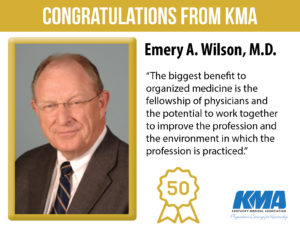 What has being a KMA member meant to you?
What has being a KMA member meant to you?
It’s the involvement at the state level to not only engage with other physicians, but engage with the leadership of the KMA in order to forward the profession of medicine. The KMA has been good to me. I received the KMA Educational Achievement Award in 2007. It’s been a very rewarding experience for me.
What do you think is the biggest benefit to organized medicine?
It’s the fellowship of physicians and the potential to work together to improve the profession and the environment in which the profession is practiced. From a political standpoint, the KMA is standing out in front of Kentucky physicians and trying to forward the mission, if you will, of what we do.
Anything you’d like to say about being a physician for 50 years?
I did my residency at the University of Kentucky then I was in the Air Force for two years. I was in Boston doing a fellowship and was on the faculty of Harvard for two years. I then came back to Lexington on the faculty (at UK) for twelve years. That was back when I did honest work. Then I was dean of the medical school for the next 18 years. My subspecialty was infertility and reproductive endocrinology. The thing I’m most proud of is helping couples achieve a pregnancy. I get a lot of satisfaction from people who come up to me years later and say “guess what my son (or daughter) is doing now?” Not many of us are going to be famous. Not many of us will be president or win a Nobel Prize. The only thing of significance that most of us will accomplish is through our children and our children’s children.
I was involved in the first successful in vitro fertilization in Kentucky. About 15 years ago I got a call from a young woman who wanted to come by and say hello. When she did, I found out she was the progeny of the first in vitro fertilization. She was a senior at UK. She’s now a physician assistant in the Army.
Where do you hope to see medicine in the next 50 years?
I hope it really gets back to having patients as the core of our mission. I hope that we can get away from the technological issues that inhibit our interaction with patients. I understand that computers and medicine are probably important. I think we have to find ways to expedite how we use computers and how we use that information. I think that what that has caused is for physicians to not have the time to spend with patients because they have to make sure the computer is up to date. I hope we find ways to put the patient more at the center of our efforts and our attention.
Any advice for future physicians?
If future physicians really understand the history and the importance of being a physician and being someone who is trusted as a physician and maintains those professional things they need in order to be a good physician, the future of medicine will be fine. We really have a lot of intelligent young people coming through the system. I’m not smart enough to be a student now. I was smart enough to be a dean, but not smart enough to be a student. I feel very fortunate that I had the opportunity to do what I did. I hope students keep the important things in focus the way their forefathers did.

